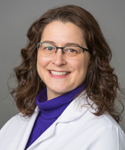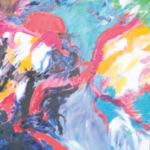In Durham, N.C., a delayed peak in COVID-19 infections gave medical teams at Duke University Medical Center several weeks to make plans for a surge of infected patients. These plans included a swift response by rheumatology providers to transition their largely immunocompromised patient population to virtual care, according to Lisa Criscione-Schreiber, MD, MEd, assistant professor of medicine in the Division of Rheumatology and Immunology at Duke University. She spoke with The Rheumatologist about how the pandemic is affecting her clinic and teaching.
Q: How are you and your staff adapting to the sudden changes brought about by the pandemic?
Duke scaled up telemedicine impressively quickly. All of our faculty, APPs [advanced-practice providers] and fellows are now trained and conducting video visits with patients who have appropriate technology, including a smartphone. Our infusion centers have redistributed patient appointments to maximize distance between patients and staff. Our administrative assistants have worked with [Office of Information Technology] to reroute faxes directly to their email addresses for distribution. The communication level and coordination between all of us and our administrative assistants, front desk staff, medical assistants, pharmacists and triage nurses has been impressive.
Q: How is your teaching being affected by COVID-19?
The crisis forced us to incorporate virtual learning, which has been good in many ways with increased engagement by faculty members with our fellowship educational conferences. This has made for richer discussions and provided the opportunity for other specialists such as those in infectious disease and pulmonary to virtually attend our grand rounds.
I am also incredibly excited to participate in the Virtual Rheumatology Learning (ViRL) collaborative that Anisha Dua, MD, MPH, from Northwestern University spearheaded and Beth Jonas, MD, FACR , of the University of North Carolina from the ACR Committee on Rheumatology Training and Workforce Issue s immediately supported. I hope national educational collaborations like this will be an ongoing legacy of the COVID-19 crisis and am so excited to learn from colleagues around the country.
The hardest thing has been clinical teaching. We are now supervising fellows and giving feedback on their virtual visits, which is new and different for all of us and there is a learning curve. It’s also hard for them because we are all wondering when and if we will get pulled into the hospital. One big challenge has been trying to provide good teaching opportunities for our APP fellows, who just started being able to see patients in early February—just before we pivoted to being primarily virtual.
Q: What types of appointments are you conducting, and what are patients’ chief concerns regarding COVID-19’s potential risks and symptoms?
I have been conducting outpatient visits by telephone or video.
My patients are most concerned that they will run out of hydroxychloroquine and not be able to get refills—this has already happened to some of them. So a lot of conversations have centered around how to safely dose reduce. They are worried about their risk of severe COVID-19 due to immunosuppression should they contract it. So it seems everyone is strictly adhering to the North Carolina governor’s shelter-in-place order.
Q: How is the pandemic affecting you, your staff and your students personally?
It’s hard to concentrate on anything besides thinking about COVID-19. For us, as we wait for the surge to come, the main thing I have experienced is social isolation, disrupted schedules and the anxiety that comes with spending weeks preparing for an impending disaster. I am anxious for my fellows’ wellbeing and their education.
Working to come up with a balance of doing work while tending to the emotional needs of my family and fellows is challenging, but purposeful. I am in absolutely no position to complain, and my heart aches for my colleagues around the country and the patients and their families who have been deeply affected.
Carina Stanton is a freelance science journalist based in Denver.




